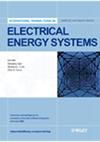Flexibility evaluation and flexible comprehensive optimization in power systems
引用次数: 7
Abstract
SUMMARY Smart grid puts forward new requirements in the planning, operation and management of power systems. Flexibility is one of the most important characters among the requirements. Traditional optimization analysis methods with single objective function and rigid constraints can hardly meet such requirements. This paper introduces the original concept of flexibility in industry process system analysis into power system analysis, analyzes their main differences and makes subdivision of power system flexibility into four kinds, namely property, constraint, load and structure flexibility. Rigid constraints in traditional analysis methods are transformed into flexible forms, and a power system flexibility evaluation method is proposed. Flexibility indices are defined and calculated to give intuitive measure of power system flexibility to grid dispatchers. Then, a flexible comprehensive optimization model in power system analysis is established. The result obtained is not an optimization for a single objective, but a comprehensive optimization considering system economy, safety and other objectives. Case study on IEEE 30-bus test system shows the validity of the methodology proposed. Copyright © 2011 John Wiley & Sons, Ltd.电力系统柔性评价与柔性综合优化
智能电网对电力系统的规划、运行和管理提出了新的要求。在这些要求中,灵活性是最重要的特征之一。传统的单一目标函数和刚性约束的优化分析方法很难满足这一要求。本文将工业过程系统分析中原有的柔性概念引入电力系统分析,分析了两者的主要区别,并将电力系统柔性细分为性质柔性、约束柔性、负荷柔性和结构柔性四种。将传统分析方法中的刚性约束转化为柔性约束,提出了一种电力系统柔性评价方法。通过对柔性指标的定义和计算,为电网调度员提供电力系统柔性的直观度量。在此基础上,建立了电力系统分析中的柔性综合优化模型。所得到的结果不是针对单一目标的优化,而是考虑系统经济、安全等目标的综合优化。以IEEE 30总线测试系统为例,验证了该方法的有效性。版权所有©2011 John Wiley & Sons, Ltd
本文章由计算机程序翻译,如有差异,请以英文原文为准。
求助全文
约1分钟内获得全文
求助全文

 求助内容:
求助内容: 应助结果提醒方式:
应助结果提醒方式:


